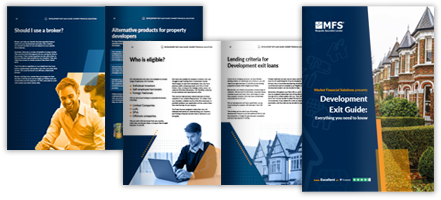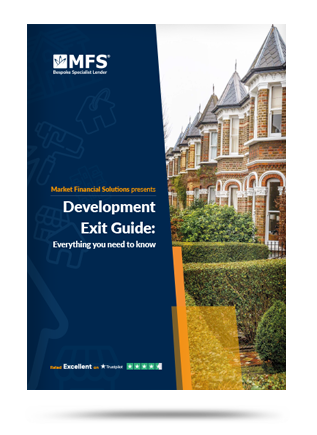Disclaimer
MFS are a bridging loan and buy-to-let mortgage provider, not financial advisors. Therefore, Investors are encouraged to seek professional advice.
The information in this content is correct at time of writing.

Property development is back on the agenda. That is, if it ever wasn’t. As 2024’s general election approaches, it’s clear housing will be a key focus for all the parties involved.
After endless promises to build new homes themselves, both the Conservatives and Labour have recently unveiled plans to open up the rules, and support expanding developers across the UK.
Michael Gove has set aside infrastructure funding to build across various cities. He also also laid out plans to reform the planning system. The aim being to “put power in the hands of local communities to build their own homes, and unlock planning decisions”.
Meanwhile, Keir Starmer has vowed to back “the builders, not the blockers” if they win next year. Also, controversially, he has confirmed Labour would allow more building on Green Belt land.
How these proposals will pan out remains to be seen. But what’s clear to see is that the state is keen for more development to address our housing needs.
Property developers and investors may be incentivised to act. If you want to get ahead of the momentum, you’ll want to make sure you know which development finance options and development exit options are available to you.
Source: Gov.uk, The Telegraph
What types of development projects are there?
The development finance options available will likely depend on the type of project you’re going ahead with. Developments can fall into many categories and strategies but broadly, your plans will fit into one of a few key areas.
There is residential development, where single homes, multiple houses, or multi-unit accommodations are built. Then there are commercial projects which can include the development of everything from offices all the way through to industrial facilities.
There is also regeneration, or conversion developments, which may involve light refurbishment work, or structural changes that require planning permission. Finally, ground-up developments involve building from scratch on plots of land or other foundations.
Generally, while the details of the funding behind these developments will vary, they can all fall under the “development finance” options.
Source: Online Mortgage Advisor
Development finance options – the basics
Property development finance usually takes the form of a short-term loan designed to finance the construction, refurbishment, or conversion of buildings. There may be further sub-categories involved, which will be varied by the project being worked on.
For instance, pre-planning finance may be available if you want to get your investment moving, but you haven’t secured planning permission yet. This funding can help cover the costs of obtaining planning permission, and the land you’re working on.
Student accommodation development finance is used specifically for student accommodation, which may include blocks of flats or HMOs. Meanwhile, you may also come across sales period loans, which can cover the marketing portion of your development project.
Unlike mortgages and other forms of long-term finance, which tend to be based on current values, development finance options are assessed on the expected value of your project once it’s completed. Development lenders will use a Gross Development Value (GDV) calculations to assess your application, along with other measures. According to OakNorth Bank, most development finance lenders will expect the total costs of the project to be 75% of the GDV or less.
Source: OakNorth Bank

Crowdfunding – pooled resources
While development finance may be the first thing that comes to mind, there are other options for developers. It’s possible to crowdfund for a development, where funds of many investors (the crowd) are pooled together to be used to either buy a property, or lent to developers as a unique form of development finance.
Crowdfunding can fall into one of two categories. There is equity crowdfunding, where you invest in property shares via a Special Purpose Vehicle (SPV).
Here, you’d receive income from the rent generated, if it’s a rental property, as a proportion of how much you invested. You could also receive a proportional share of a profit gained from the property/development being sold on.
Then there is debt crowdfunding. This is a secured form of lending where you’d invest money with the crowd to be lent to a developer. If you were to choose this route, you’d earn interest from the loan repayments.
Source: London House Exchange, UOWN
The government may be able to help
While there are many options out there in the private sector, you may also be able to receive support from the state. In early 2023, for example, Homes England provided development finance options for small and medium housebuilders through the Levelling Up Home Builders Fund.
The funding was created specifically for housebuilders who struggled to access finance through traditional, mainstream lenders. Specifically, this scheme aimed to support off-site manufacturing, community-led housing projects, serviced plots for custom and self-builders, and other types of projects.
Also, last year, the government set aside infrastructure loans for those who were preparing land for homes. These were more long-term products which could stretch to £250 million and cover infrastructure and enabling costs.
There may be numerous public schemes available to you. And with rising focus on the development side of the market, more support is likely on the way.
Joint ventures – partner up with likeminded investors
Joint venture development finance can allow you to get up to 100% of the funding you need for your project. This form of finance is usually used for residential, or mixed-use properties.
Two or more developers (or partners, lenders etc) will pool their resources to fund the project through to completion. Those who offer this option of development finance usually cover all the costs involved – including the land purchase, material costs, and labour costs.
In exchange, they’ll require a substantial share of the profits your project generates. In some cases, this can be as high as 50%. This form of property development finance can be of use to those with limited resources, as they will not be required to put any of their own capital towards the project.
Source: Online Mortgage Advisor
Alternatives and specialist finance
There are multiple development finance options available, many of which have not been touched here. Aside from what’s listed above, you could also investigate other alternatives such as mezzanine development finance, or super stretch development finance.
We cannot advise you on what development finance options are best for you though. We are not financial advisers or wealth planners, and it will be up to you to determine what’s right for your development plans.
Also, it’s important to note that MFS do not provide property development finance. Although, we have a range of specialist bridging products that can help with property purchases, refurbishments, and more.
Our development exit loans can also help developers who are coming to the end of a project. This funding can be used to cover the initial development finance you took out to fund your investment. This could provide you with breathing space to finalise your plans, and avoid selling off individual units at a reduced price, just to hit a looming deadline.
Property development can be tricky. There are numerous rules and regulations to follow, and this is before you factor in the state of the wider economy.
Fortunately, our flexibility allows us to adapt to whatever headlines shape the market, or your circumstances. We’re here to discuss your plans when you’re ready.
Development Exit Finance
A complete guide
Everything you need to know
- Benefits & costs
- Difference to development finance
- Application & loan process
- Repayment options




